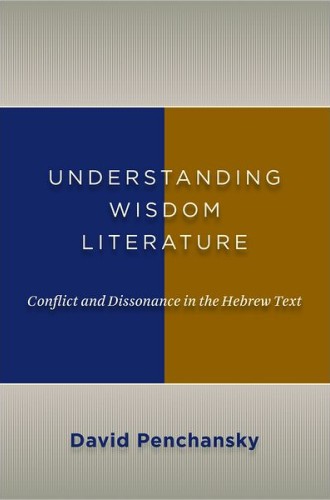Understanding Wisdom Literature, by David Penchansky
People often assume—wrongly—that the Bible presents a single view of God and the world. In Understanding Wisdom Literature, David Penchansky shows how the Hebrew Bible’s wisdom books, Proverbs, Job and Ecclesiastes, speak differently from covenant-centered writings such as Genesis, Deuteronomy and Isaiah. Two additional wisdom books, Ben Sira and the Wisdom of Solomon (found in the Roman Catholic and Orthodox canons), have connections to both the older wisdom books and the Jewish covenant traditions.
Penchansky, a Hebrew Bible scholar who teaches at the University of St. Thomas in St. Paul, Minnesota, has focused throughout his career on neglected aspects of biblical theology. He celebrates the diversity and unconventionality of the Hebrew Bible’s wisdom books while taking a dimmer view of apocryphal wisdom’s rapprochement with traditional belief systems.
Read our latest issue or browse back issues.
Wisdom’s fundamental questions concern the fairness of life and how to negotiate life well. Israelite wisdom probably originated in family, village and tribal settings in which wise people grappled with life’s questions on the basis of experience and observation. Some of this rural wisdom survives in proverbs about the diligence of the ant and the sad fate of lazy farmers, but Penchansky agrees with scholars who believe that the Hebrew Bible’s books of wisdom were written in urban settings by professional sages who advised kings and who educated young people for careers in the court. Like their rural predecessors, these sages sought answers in ordinary experience rather than special revelation.
In a chapter titled “Sounds of Silence: The Absence of Covenantal Theology in the Wisdom Literature,” Penchansky reviews various interpretations of the sages’ silence about covenant theology. Is covenant theology unmentioned because though the sages embrace it, they are dealing with unrelated subjects? Does their silence indicate their disagreement with covenant theology and perhaps fear of persecution by its proponents? Do they simply consider covenant theology unimportant? Penchansky chooses the last option. He describes the sages as Yahwists—persons who assumed the power and importance of Israel’s God—but Yahwists for whom the Abrahamic, Davidic and Mosaic covenants were not central to the interpretation and conduct of life. This suggests, says Penchansky, that Israel was less distinctive and more diverse than Christians have traditionally supposed and that there was an “uneasy tolerance” between its various factions.
The themes of diversity and conflict dominate Penchansky’s discussion of the Hebrew Bible’s wisdom books. He sees in Proverbs a conflict between two understandings: a “Get Wisdom” view (Prov. 4:7) that the universe operates by discernible rules that can guide profitable choices, and a “Fear God” view (Prov. 1:7) that God’s ways are too unpredictable for us to count on, so that our best hope is an appropriate fear, somewhere between reverent piety and terror, of this powerful, unknowable God.
Conflict also appears as a theme in Penchansky’s discussion of Job, a book that spotlights innocent suffering and associated questions about God’s goodness and justice. Penchansky correctly notes that how we interpret the book will vary according to the voice in it that we emphasize, for the prologue, Job’s speeches, his friends’ speeches and the whirlwind speeches all portray God differently. Penchansky privileges Job 42:7, where God says that Job has spoken rightly. This affirmation must refer to Job’s arguments in the middle of the book because if it referred to Job’s patience recounted at the beginning of the book or to his submission (if it is that), recorded in 42:5–6, there would be no contrast between what the friends have said and the words that God approves. Job 42:7, says Penchansky, supports Job’s claim that God has acted cruelly and unfairly. The book of Job, then, not only contains conflicting views but conflicts as a whole with Proverbs’ optimism about being able to live in a way that will lead to prosperity and health.
In Ecclesiastes, Penchansky hears three voices, perhaps all from a single author: a pessimistic one for which “all is vanity” (Eccles. 1:2–3), another that instructs us to “fear God” (12:13) and a third that commends enjoyment of life (9:7). Though Penchansky prioritizes the pessimistic voice, which, he observes, dominates the structure of the book, he reminds us that it still “allows other voices to be heard.” The resulting contradictions are, for Penchansky, the book’s “most important feature.”
The authors of the Greek wisdom books, Ben Sira and the Wisdom of Solomon, lived and taught in a world where traditional Jewish wisdom was belittled by a sophisticated, internationally influential Hellenistic culture. The sages reacted by upholding a now-scriptural covenant theology. In Ben Sira, Penchansky says, “the tradition of doubt and severe, honest questioning was lost, replaced with a pious acceptance of revealed truth,” while the pseudonymous author of the Wisdom of Solomon “appealed to authority and tradition to shut down debate.” Penchansky does not celebrate these responses. He laments Ben Sira’s identification of Sophia, who in Proverbs is (in Penchansky’s words) “a Hebrew goddess, the daughter of Yahweh,” with Torah, a possession of Israel and Israel alone. He is equally discontent with Pseudo-Solomon’s use of the prospect of immortality to “shore up the old notion of divine retribution.”
Penchansky admits his preference for Hebrew wisdom’s openness to questions and challenge. One senses that he thinks we need a similar openness and tolerance for conflicting views today, an assessment with which I agree. The sages who gave us the Greek wisdom books, Penchansky suggests, sacrificed this independent tradition in order to placate the priests whose children they tutored. He offers, however, a second interpretive possibility that sees the Greek sages overtly celebrating Jewish tradition while reshaping it in conversation with Greek culture. I think both assertions may be true, and I wish Penchansky had spent a little more time showing readers the ways in which Ben Sira and Pseudo-Solomon incorporated new ideas, even as they proclaimed their allegiance to old ways.
Unfortunately, Penchansky ignores the dynamics of oral tradition. Although the wisdom literature has been passed down to us in writing, it retains the rhetorical style of oral culture, in which complexity is handled less by carefully qualified and nuanced arguments than by the juxtaposition of competing proverbs (as in the “all is vanity,” “fear God” and “enjoy life” themes in Ecclesiastes). Perhaps we are not meant to take any of these as universal claims but should consider them alternatives, expressed in the dramatic hyperbole characteristic of oral culture, from which the wise person must select in particular situations.
I nonetheless recommend Understanding Wisdom Literature. Penchansky rightly points out how bold the sages’ questions are and how wide the range is of the answers they explore. The Bible doesn’t only exhort us to submit to revealed truth. Its wisdom traditions also invite us to be honest about the places where conventional explanations fall short—and even to dialogue with other cultures and traditions about our experience of life. Penchansky models wisdom’s honesty when he confesses at several points that he is not sure which answer to a given question is most nearly correct. I commend him as a guide to the treasures of biblical wisdom.





